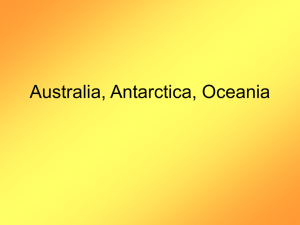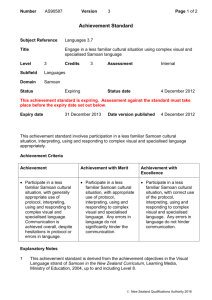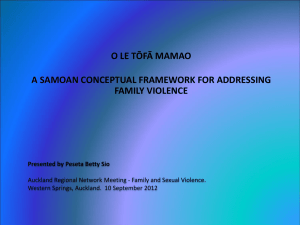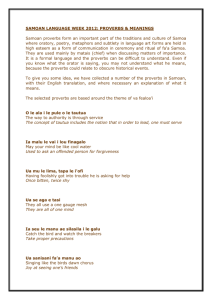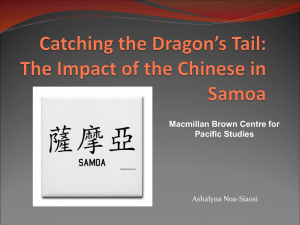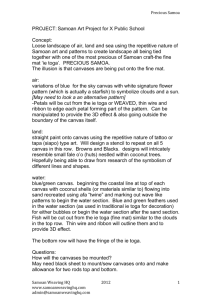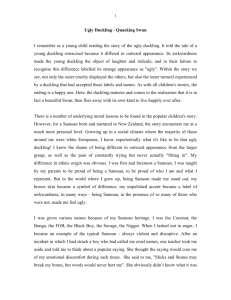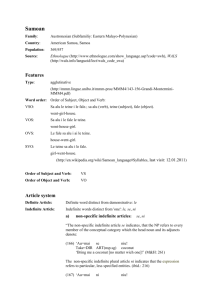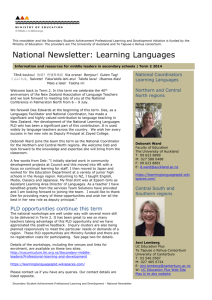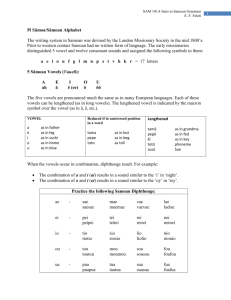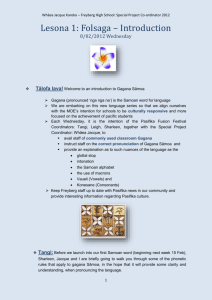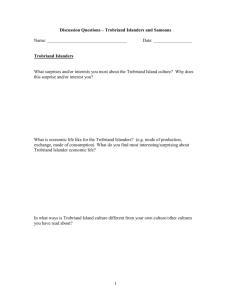Family - A Samoan Perspective - Health and Disability Commissioner
advertisement
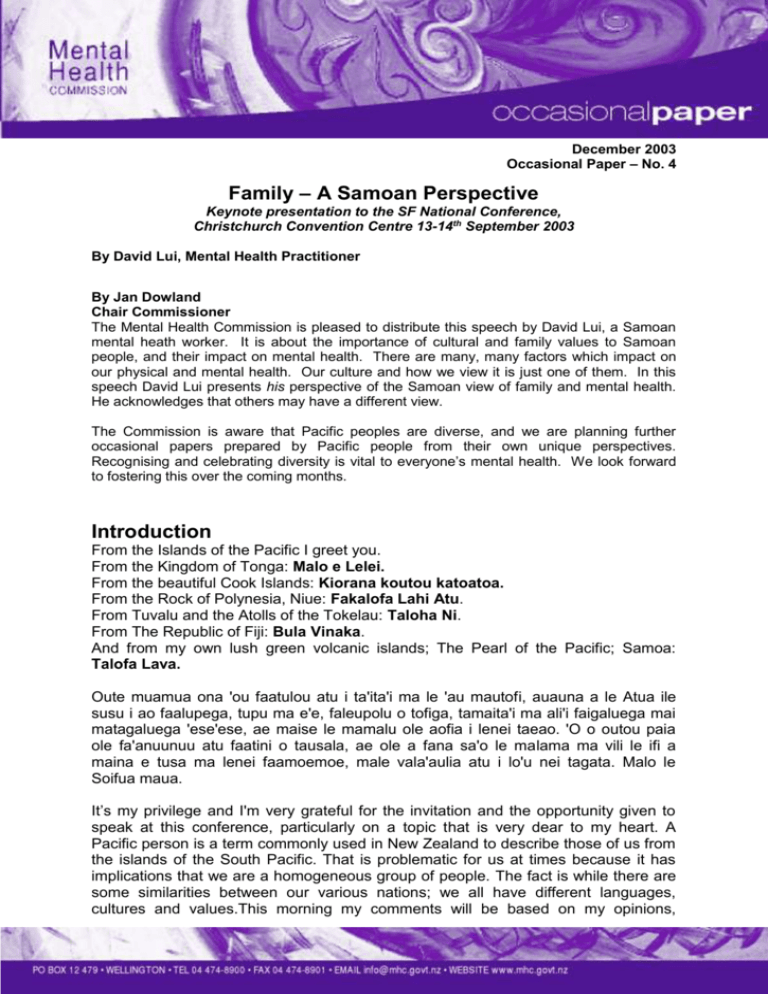
December 2003 Occasional Paper – No. 4 Family – A Samoan Perspective Keynote presentation to the SF National Conference, Christchurch Convention Centre 13-14th September 2003 By David Lui, Mental Health Practitioner By Jan Dowland Chair Commissioner The Mental Health Commission is pleased to distribute this speech by David Lui, a Samoan mental heath worker. It is about the importance of cultural and family values to Samoan people, and their impact on mental health. There are many, many factors which impact on our physical and mental health. Our culture and how we view it is just one of them. In this speech David Lui presents his perspective of the Samoan view of family and mental health. He acknowledges that others may have a different view. The Commission is aware that Pacific peoples are diverse, and we are planning further occasional papers prepared by Pacific people from their own unique perspectives. Recognising and celebrating diversity is vital to everyone’s mental health. We look forward to fostering this over the coming months. Introduction From the Islands of the Pacific I greet you. From the Kingdom of Tonga: Malo e Lelei. From the beautiful Cook Islands: Kiorana koutou katoatoa. From the Rock of Polynesia, Niue: Fakalofa Lahi Atu. From Tuvalu and the Atolls of the Tokelau: Taloha Ni. From The Republic of Fiji: Bula Vinaka. And from my own lush green volcanic islands; The Pearl of the Pacific; Samoa: Talofa Lava. Oute muamua ona 'ou faatulou atu i ta'ita'i ma le 'au mautofi, auauna a le Atua ile susu i ao faalupega, tupu ma e'e, faleupolu o tofiga, tamaita'i ma ali'i faigaluega mai matagaluega 'ese'ese, ae maise le mamalu ole aofia i lenei taeao. 'O o outou paia ole fa'anuunuu atu faatini o tausala, ae ole a fana sa'o le malama ma vili le ifi a maina e tusa ma lenei faamoemoe, male vala'aulia atu i lo'u nei tagata. Malo le Soifua maua. It’s my privilege and I'm very grateful for the invitation and the opportunity given to speak at this conference, particularly on a topic that is very dear to my heart. A Pacific person is a term commonly used in New Zealand to describe those of us from the islands of the South Pacific. That is problematic for us at times because it has implications that we are a homogeneous group of people. The fact is while there are some similarities between our various nations; we all have different languages, cultures and values.This morning my comments will be based on my opinions, knowledge, understanding and perspective as a Samoan. I don't purport to speak on behalf of all Samoans. In fact there may well be other Samoans who may hold a different opinion from my own. Samoan perspective of health Pacific people have a holistic view of health where a person is in tune with his/her environment and community. Health is achieved when there are positive and balanced relationships between these three elements: Atua (God), Tagata (people) and Laufanua (land/environment). Health is the state in which a person’s physical, mental and spiritual needs are in balance and the person is able to meet their obligations to themselves, their family, village and community. The relationships between these three elements are defined and guarded by tapu. There are also relationships between people. In Samoa every relationship is sacred (tapu), and every relationship has boundaries. These are also defined and guarded by tapu. Infringing of the tapu means a person enters an area of risk. It may result in the person being punished by the guardians of the tapu thus finding his or herself outside of the correct relational arrangement resulting in an unbalanced relationship leading to and illness (faatafa gasegase) or at worse the breach if serious can bring upon a curse. Basic values of Faasamoa The three basic Values of Samoan Culture are: alofa, faaaloalo and faamagalo. Alofa (love) is the concept of giving, receiving and sharing of gifts and qualifies most Samoan ideals. In health, the traditional healers (Taulasea) provide their service out of their love for people and their desire to help them. For this reason, the skill or mana of healing that they possess is a gift that has been handed to them from one possessing this gift. This process involves the washing (fafano) of hands. The person who has the gift of healing washes their hands in a bowl of water together with the recipient. Thus, the gift is handed over. The recipient is then able to perform the treatments (Fofo) that the previous healer performed for those seeking wellness, knowing that alofa (love) underpins the receiving and giving of the healing process. In return the sick person (Ma’i) seeking remedies from the Taulasea will show their alofa through the genuine offering of gifts (food, fine mats, money) to the Taulasea for their service. Love and care is usually transferred to the person who is unwell through the touch of massage and gentle rhetoric. Fa’aaloalo. (respect) is the foundation of good relationships. Relationships bind everything together. The protocols and etiquettes that define the respectful behaviour (tu ma aga) are known by samoans as va fealoaloai or ava fatafata. These protocols and etiquettes are needed to maintain good relationships (relational arrangement). Fa'amagalo. If a person breaches a tapu, it finds him/herself outside of the correct relational arrangement. The protocols and etiquettes allow the person to return to the correct relational arrangement. The individual can seek forgiveness (fa’amagaloga) by undergoing the process of fa’atoesega (formal apology) in order to rebuild relational bonds. The process of fa’atoesega is an appeal to a person's sense of forgiveness (fa’amagalo). Consider an extreme case where a person is killed in an altercation with a person from another family in another village. Members of the accused's family and/or village will undergo a ifoga which is a process where chiefs, elders, parents of the 2 accused, covered with fine mats, will kneel outside the victims fale (house) basically leaving themselves at the mercy of the victims family and village. They can spend any amount of time in the hot sun while the victim’s family contemplates their position. The decision to forgive is almost inevitable. In which case they will bring the family/group inside the fale and begin a process of reconciliation and forgiveness (fa’amagaloga). This process is very important not only for the accused and their family but also for the victim’s family as well. Hate destroys the soul. The process of fa'amagaloga instigates the healing of the soul and allows both victim and accused and their families to deal with the past and move on. Fa'amagaloga and fa'ato'esega is not about justice, it is about rebuilding relationships. Even if a person is deemed justified in carrying out an action, he/she must apologize to the victim so that both can deal with the past and move forward to the future. Important concepts of Faasamoa Important concepts of Samoan culture are kinship and family. Samoans have a very strong sense of identity and belonging. Samoans have a strong link and attachment to each other but also to God, our spiritual side, to our ancestors, our land and homeland. Even those born overseas still feel that sense of belonging. An example is my earlier work in the marketing field for the Samoan Government, after I graduated from Varsity here in the Garden City, in the early eighties. My job took me to some exotic places around the world, to cities and places much bigger and modern than Samoa, yet I my greatest feeling is on my return. When the pilot announces that we are about to land at Faleolo Airport, a warm feeling from inside you, and the feeling of returning home. My sense is most people get that feeling when they return home. Family In Samoa the unit of society is the family not the individual. In Samoa everyone belongs to a family. Your family is your refuge. Families make up the wider community. Communities make up the society we live in. When a person says he/she does not have family, the message that conveys to me is there may have been a falling out or there are relational issues that need resolving to bring the family back together again. Family is made up of individuals. These individuals are held together by relationships (va). Every relationship is sacred (tapu or sa) and is sealed by feagaiga (covenant). Every relationship has boundaries, which are defined by tapu and sa. Breaching the tapu can result in a curse being brought upon a person. On the other hand, maintaining good relations (teu teu le va) can bring blessings (faamanuiaga). An example is given by Tamasese, K & Laban, LW (1993) in their paper titled Gender – The impact of Western Definitions. It refers to the relationship between brother and sister. “The sister, when born, is known as Tama Sa or sacred child, the brother, Tama Tane or male child. … The covenant relationship ensures the sister’s powers of blessing and cursing…the brothers were required to seek their sister’s agreement for any decisions relating to lands and title. Without that agreement he risked a curse.” Factors Affecting Relationships 1. The way to maintain relationships is called ‘va fealoaloa’i or ava fatafata (referred to earlier). Va and ava refers to the gap or relationship, fealoaloa’i and fatafata refers to face to face. Hence the importance that Samoans have on verbal and personal contacts and meetings. This concept sometimes conflicts 3 with clinical practice that workers should not form personal relationships with clients. Writing letters, emails and phone conversations are not the preferred means of communication for Samoans. It must be accompanied with face-toface visits so that good relations are maintained. For Samoan and Pacific workers it creates a dilemma. 2. The New Zealand environment puts emphasis on the individual and being independent. Samoan culture puts emphasis on family and interdependence between individuals. The conflict and pressure on Samoan worker, to adopt the palagi way contrary to their culture and upbringing, results in dilemma for the worker. If the worker follows the palagi way the outcome may not be as good; if you follow the Samoan way you get in trouble with your employer. 3. Another factor that impinge on family and relationships is the financial pressures. In some families both parents work. In some cases they work two jobs and surviving on only a few hours sleep in order to make ends meet. The effect is two fold. Firstly there is no time to maintain relationships with children and extended family. Secondly, the children are now being taught by the TV and teachers at school about contemporary values, but not having the opportunity to learn about their Samoan culture and values. 4. Another important issue is the emphasis here on individual privacy and confidentiality. Samoan families were in some cases denied visitation rights and not given information about family members, thereby denying the family the opportunity to participate in the planning, treatment and care of their loved one. In Samoa confidentiality rests inside the realms of the family, not the individual. Moe importantly the solution, treatment or healing must also be done in the same family environment (fofo ele alamea le alamea). When families are denied that right, then the healing process is adversely affected. Decision-making The process for reaching decisions is called soalaupule or sometimes referred to as faafaletui. The matais or chiefs and elders take the lead but everyone’s opinion is valued. This process can take hours, days even weeks depending on the issue. The participants will continue dialogue and discussion until they come to a decision (consensus). Soalaupule is not so much about reaching a consensus of opinion as it is about process for agreeing on a way forward. At the conclusion of the process participants do not necessarily agree to have the same viewpoint/opinion but there is agreement on how to proceed. These processes allow families and individuals to resolve issues and maintain good relations. The adoption of western justice systems now means many of our conflicts are resolved in court rather than through the process of soalaupule and dialogue with different outcomes. A simple analogy is justice systems results in winners and losers. The cultural process results in win/win situations and all parties can move forward with no hard feelings. Ability to cope One’s ability to cope determines their state of wellness/health. Worry, stress, despair, mental instability originates from our not being in control of things and from the failure to cope. Ones knowledge of their culture and heritage is an important element in developing the ability to cope. The idea of returning to one’s culture and roots to find peace and acceptance is one way of coping when faced with uncertainty, adverse situations, illness and even death. This knowledge allows a person to understand 4 their place in the bigger scheme of things. So you don’t fear, get confused or despair but celebrate living and life. Even in death, the knowledge of the after life and heaven as an extension of being or family is a soothing thought and helps us to cope. The family provides the individual with the atmosphere and the environment to heal (the idea of refuge mentioned previously). Traditionally in Samoa, family members and extended families look after [mental health] consumers. Sometimes even the whole village plays a part. Consumers participate in normal everyday activities of life, – preparation of food, cleaning, looking after children etc. They attend evening prayers, church, family and village meetings or fonos like everyone else i.e. the same expectations are put on them as everyone else with perhaps an adjustment for their disability. In New Zealand families still try to cope with looking after family members with mental health issues. But the usual structures and relationships that exist in their homeland are not in place here in the New Zealand environment, so they struggle. The result is many of our Samoan and pacific consumers present to the mental health services in a very severe state, usually under the Mental Health Act, because families have tried to look after them at home. (Case Mix Study, HRC, results released recently clearly showed this). Cultural Knowledge and Identity The learning process starts from home – family. It is the arena where we learn about health, decision-making, culture, social issues, health, conflict resolution and life itself. Some Samoan families don’t have the knowledge of their culture to pass onto their children as they have been raised in a different environment and also some of our cultural knowledge has gone to the grave with the custodians of the culture. Knowledge of your family’s history or tupuaga, gafa and genealogy gives meaning to your name and defines your place in your family and society. Many Samoans especially young Samoans are having an identity crisis. They are confused and unsure about their place in New Zealand society. Some feel they don’t fit into either the Samoan or the mainstream society, resulting in feelings of shame, depression or suicidal. The solution to the identity crisis is not to just focus on rehabilitating young people. As mentioned before, the solution must include family. To coin an expression: ‘you can take a person out of the family, but you cannot take the family out of the person’. We can’t expect young people to understand the family’s journey if story of their journey has not been given to them. This can be done through the use of story telling or fagogo. For many of us parents we also need to educate ourselves in terms of the young person’s journey and the issues that they’re grappling with in this new environment. When parents fail to tell their children their story and fagogo and to educate them about their culture, then the only education they get is school, the TV, the Internet and their peers. Conflicting Paradigms Mental Health system is based on western and medical paradigms. Samoan people for example operate from a Samoan paradigm, the two often are in opposite directions and don’t meet. To add to the complexity, Samoans have been colonised and have been taught the western paradigm or have been taught that western paradigm is superior, that palagi ideas are the right ones. To put it another way some Samoans don’t understand the Samoan paradigm. We also have what some people 5 have referred to as the “fifteen minute experts” who think they know the Samoan paradigm, culture and philosophy. As a mental health practitioner I am faced with these dilemmas and conflicting philosophies almost on a daily basis. Take privacy and confidentiality as an example. In order to create a relationship with a person we need to find a connection with that person. This in turn involves finding out information about his history and information about his family. Usually this would involve talking with family and other community people. This can sometimes not be possible due to privacy and confidentiality concerns from the responsible clinician or agency. Another dilemma is the issue of treatment and interventions. On one end is the cultural argument that emphasizes the importance of disclosure and sharing of information with the family so an appropriate care plan is developed to meet the consumer’s needs. At the other end is the palagi argument that emphasizes confidentiality guarding of individual information. Such a paradox is often conflicting and restricts effective interventions and recovery. Assessments Accessing family homes for assessment is like going on a visit. First thing, is to find out information about the person, their genealogy or gafa and faalupega, including the genealogy of the spouse. The purpose for this is to use cultural references to create rapport and appropriate connection with the person and family so that a trusting relationship can be established. Understanding of the basic values of Alofa, Faaaloalo and appropriate cultural references is crucial. This is because the assessment requires the disclosure of personal information that is tapu and sacred. Armed with the knowledge and information and using skill, ability and understanding of the culture, you are ready to go to work. Samoans tread carefully, respectfully and sensitively around issues; looking for the connection to build that bridge with the person, only getting to the point when it is safe to do so. This process takes time. If I’m continually looking at my watch or am rushing the process because I have another appointment, it reduces the chance of a successful outcome. I often volunteer information about myself, where I come from, village and family as part of this process. Disclosing personal details about myself before eliciting personal details from the person is a sign of goodwill and assists in building a rapport. Looking after Sick Samoan people, especially the elderly, prefer that they be looked after by their own aiga or family. One reason is the belief that outsiders (non-family members) lack the personal insight that family members possess having lived with them and cared for them before. Older people believe that it is the sacred duty of their children to care for them, because that is where they get their blessings (manuia). The other reason is they do not want outsiders to witness them when they may be in compromising situations during their illness. It relates back to point made earlier that privacy is seen in the realms of the aiga (family). There are no secrets within the family but family secrets/ information should stay within the family. When Samoans refuse care from health professionals, it is not a personal matter, nor is it about their knowledge or skill. The family’s decision is based on motive. Until the family is satisfied that you are sincere and genuine they won’t let you near them. 6 Example To demonstrate this point, I refer to one of my colleague’s experience with health professionals, in relation to her elderly father’s illness, which she found somewhat daunting and challenging. When the father’s health deteriorated the assessors concluded that the family’s house was not suitable for the care of her ill father. Her father protested and clearly expressed resentment saying that he didn’t want anybody caring for him but his own family members. While in hospital, the family pleaded with doctors to stay with her ill father even after the visiting hours had expired (sleepovers). The hospital administrators allowed the sleepovers of family members but it meant sacrificing their jobs to look after their father. My colleague opted to give up her job despite knowing that her family needed her income because her Samoan values (reciprocity) were far more important to her. Her father had provided for her needs when she was young and in the fa’a-Samoa, she has an obligation to reciprocate. This reprocity is bound not just by a sense of obligation, but by love and the understanding that it is the source of blessings (manuia) for her and her family. Conclusion These examples highlight important cultural values and issues that the younger generations of Samoa and pacific are required to articulate to the decision-makers, who grapple with issues of privacy and confidentiality. Decision-makers, policymakers, bureaucrats as well as health providers should do all they can to remove the barriers and anomalies so that family can be fully informed of the needs and problems faced by their unwell family member. The mental health system should have the flexibility to embraced paradigms other than the medical and Western paradigms to allow this to happen. Like the theme of this conference: “Every cloud has a silver lining.” While pacific people have issues we have to grapple with, there are opportunities for us to reclaim some of the knowledge and pacific processes and utilize it to formulate solutions to some of the problems we face. In New Zealand the context is different when compared to those of us brought up in Samoa. We need to recognize the rituals are the essence of culture. The emphasis should not be on how we perform the ritual but how we express the fundamentals such as, reciprocity, respect and love which is what we should pass on to our youth. Encouraging youth to participate and absorb our cultural practices is the responsibility of parents and family. The important thing is the values, which will endure; values such as family, our heritage and spirituality. If this survives from generation to generation, then culture will live on. Our principal duty is to impart to our youth cultural knowledge and cultural references. These cultural references are relevant to our work especially as it impacts on the mind. Palagis will never understand what disturbs or motivate the Samoan mind. You have to be Samoan to understand how we think. The challenge for Samoans is to learn your culture and understand the Samoan psyche. I’d like to conclude by leaving you with the parting words of the Tuitoga as left Samoa, after one of the many conflicts between Samoa and Tonga in ancient times. These words is captured in one of our most prestigious Matai title currently held by our Head of Sate, Malietoa Tanumafili 2nd, He said” Ua malie toa, ua malie tau. Ole ‘a ou alu oute le toe sau ise ao uliuli tau, ae oute toe sau ile ao uliuli afo lau.” 7 You have been great warriors and you have fought a brave battle. I will go but shall return, not to wage war, but I will navigate my journey back in the spirit of friendship and brotherly love. Soifua, ma ia manuia. 8
